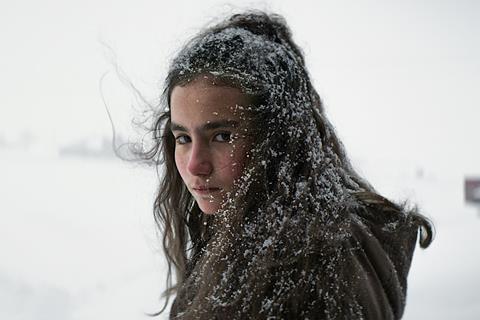About Dry Grasses Review: The Long Winter of Discontent

Francis Rogerson ‘26 / Emertainment Monthly Staff Writer
A caustic blend of Chekovian wit and Lonergan-esque banality, Nuri Bilge Ceylan’s triumphant About Dry Grasses is a film about the limits of detachment, and how it rivetingly deflates his characters while expanding the scope of his vision. Such an aesthetic and formal dedication comes at the cost of what one might consider a more typically digestible narrative, but what is fostered in its place is instead a kind of lonesome hopefulness, wistful yet sweeping, measured yet passionate.
The film follows Samet (Deniz Celiloglu), a middle school art teacher in a remote village in eastern Anatolia. From the opening minutes of the film, it is clear that he is anxiously awaiting his imminent transfer to Istanbul – his four-year tenure at this public school is mandated by the Turkish Department of Education, and his stint is almost up – as he grouses plainly to his coworker and roommate Kenan (Musab Ekici). He is irritated by his seclusion, which he sees, not just in the place but the people that inhabit it, as far beneath him. His one bit of solace comes from his friendship with young Sevim (Ece Bagci), one of his eighth graders with whom he shares a bond that is somewhat typical of a teacher and his favorite student, or perhaps vice-versa: she is something of a teacher’s pet, wandering into his office in between classes and, crucially, giving him a clandestine gift. He may paternally brush his hand against her shoulder, she may attempt a furtive hug – it’s all relative. But their intimacy, despite its apparent innocence, strains towards secrecy, and it is not long before they are, in a sense, exposed. A perceived betrayal on Samet’s part causes Selim to lash out with devastating, and perhaps unintended, consequences – implicating Kenan in the process – leaving Samet struggling to regain both his authority and his pride. As a result, any semblance of goodwill towards his community that Samet had effectively crumbles completely. It is at this point, roughly one hour into the film’s three-hour and seventeen-minute runtime, that things begin to fall into place.
What makes the film so outstanding is that Ceylan is less interested in concepts of right and wrong and more so in the intimate personal failures of a man who suddenly loses control of his own image, so staunchly unable to undertake his own reckoning that he resigns himself instead to a sort of slow, petty rebranding. Selim is left grasping for significance in a community that he harbors the utmost disdain for and winds up, perhaps rightly, scathingly deconstructed by the very people he considers beneath him. The most seismic critique he receives is from Nuray, an English teacher who lost her leg in a political protest and, after an awkward blind date with Samet, winds up caught in a sort of subdued love triangle between Samet and Kenan. Nuray is portrayed by the luminous Merve Dizdar, whose deeply felt performance earned her the award for Best Actress at the 2023 Cannes Film Festival. In one particularly memorable sequence, Nuray patiently dismantles Samet’s solipsistic ideology over the course of a protracted dinner scene, which plays in simple, tense over-the-shoulder shots until, suddenly, it doesn’t. Dizdar’s performance and the genuinely jaw-dropping formal gambit that Ceylan employs as he navigates the consequences of Nuray’s showdown with Samet are standout examples of the film’s chilling, weary mood.
Here is a picture in which everything one might expect to happen is avoided with a tempered confidence, and we are treated instead to a story in which the very nature of our protagonist, with all his intellectual posturing and moody meandering, is intimately dismantled. Ceylan uses his film to ask if a man like Samet can ever be moved from his station of dispassion, let alone changed. At the very least, the film surmises, perhaps with the change of seasons, he can begin to reflect.